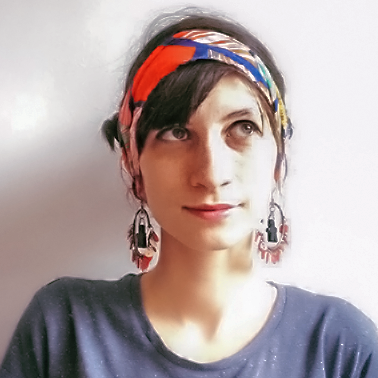Her work as an urban sociologist in Istanbul has brought an understanding of social norms as a constraint on the ways people define themselves and, for her, are “as mangling as Cinderella’s shoes.” Zeynep is currently working on her Masters Thesis on the construction of normalcy through metaphors of impairment and sexuality in Turkish melodramas. “I believe that knowledge is only useful if it’s practiced and put to use, therefore I needed an outlet for my academic knowledge and my will to support the social movements.”
“The most pressing matter for LGBTI+ people in Turkey is the basic recognition of their existence, with all its diversity,” says Zeynep. “Therefore, it is important for the LGBTI+ individuals to be heard as well as for LGBTI+ persons in other countries to see that people come together in solidarity in conditions similar to theirs, which is a great source of encouragement and resistance.”
The recent murders of Hande Kader, a well-known transgender activist, and Muhammed Wisam Sankari, a gay Syrian refugee, have made headlines around the world. For Zeynep these tragedies are “almost a daily reality for LGBTI+ individuals in Turkey. Sexual violence is growing, not only with respect to its intensity and impunity, but also in its connection with other social issues, such as ethnic polarization. It would not be exaggeration to suggest that sexual violence is institutionalized politically, from the sexist and racist graffitis of the special armed forces in the Southeast, to the political language government members use.”
“The current political climate legitimizes a mentality that sees ‘others’ such as refugees, minorities, leftists, women and LGBTI+ people as disposable beings – and this is not unique to Turkey, even if it is stronger due to our particular political context. The social norms in all realms of life dictate that some lives do not matter, that some people deserve the way they are treated or worse. This is why you see banners at the protest for Hande Kader’s murder saying ‘We want to die in our beds.’ It has come to such a level that one death is preferable to another,” says Zeynep.
Muhammed Wisam Sankari’s story is, perhaps, one of many yet to be reported broadly and questions the seemingly widespread view that simply allowing refugees into Turkey is a sufficient solution to the crisis on its border. “The rampant inequality and the fact that law is not uniformly enforced allow for such violence to be reproduced and even encouraged as is the case on extreme right wing media, centering the story around sexual orientation and gender identity of the murder victims, and the idea that ‘they had it coming.’ One should always look at the wider context of such violent murders and detect the institutionalized inequality,” says Zeynep.
In the face of these challenges, Turkey’s LGBTI+ community is organizing and “growing stronger and more experienced each year. We have a wide array of vibrant organizations from academic associations in queer and body studies, ethnic minority LGBTI+ associations, transgender guesthouses, municipal council boards, film festivals, online platforms and provincial associations, even in the small city of Anatolia where conservatism and patriarchy are most powerful,” notes Zeynep
And with all of this empowering work taking place inside Turkey there is still much work left for the international community. “Do not underestimate your potential to help. Also, you can advocate for the rights of LGBTI+ people with legal and political bodies at home. Lastly, If you have any ideas, suggestions or questions, you can always contact LGBTI+ News Turkey and use us as a bridge for communication.”

